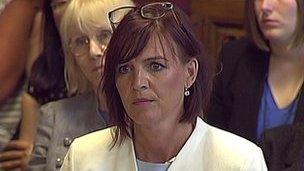Lucy Adams: BBC HR boss admits 'mistake' in evidence to MPs
- Published

Lucy Adams is to leave the BBC in 2014
The BBC's head of HR has said she made a mistake in her evidence to MPs over £25m paid to departing BBC executives.
During a Public Accounts Committee hearing Lucy Adams said she did not know of an email about the pay-offs.
She has now said she helped compose the email but did not recognise it from its description during the July hearing.
Her clarification was made before claims about her role in the payments issue were made by the former BBC director general Mark Thompson.
In a letter to MPs, external investigating the excessive pay-offs to senior executives, Mr Thompson accused the BBC Trust, which represents licence fee payers' interests, of misleading parliament.
He said that statements by the trust's chairman were inaccurate, information was kept from the National Audit Office and Ms Adams misled MPs over her involvement.
'Bizarre' statement
An attachment challenged Ms Adams' original claim that she did not know of an email explaining the pay-offs, and appeared to show that she helped to compose it.
Asked at the hearing "why did you allow a letter to go to the Trust saying that it was in accordance with the contractual terms?, Ms Adams replied: "Forgive me; I am not aware of the letter that went to the Trust. I did not actually write that letter.
When asked who did, she said: "I believe it was Mr Thompson who wrote that letter."
The BBC has been criticised for paying £2m more than contracts necessitated.
Mr Thompson said he has emails which show that trust members, including the chairman Lord Patten and Ms Adams, approved the payments.
The BBC Trust said the claims are bizarre and it denied MPs were misled.
Lord Patten: "I have no concerns at all about the remarks which Mr Thompson has made"
The 13,000-word document was prepared ahead of Mr Thompson's appearance before the Public Accounts Committee on Monday, where he will be expected to answer allegations made in July that he had not been open with the trust about pay-offs to two senior executives.
The document included a briefing note prepared for Lord Patten on defending the size of the payments.
He also claims the trust did not reveal its full involvement with the pay-offs to the National Audit Office.
Media commentator Steve Hewlett said the letter raises "serious questions".
He said Lord Patten's position could be called into question "if Mr Thompson's argument prevails".
Mr Hewlett added that if it appears that Mr Thompson, who is now chief executive of the New York Times "where executive ethics are a top drawer issue, has misled the Trust, then it is going to be very difficult for him".
The BBC Trust said: "We reject the suggestion that Lord Patten and Anthony Fry misled the PAC [Public Accounts Committee].
"We completely disagree with Mark Thompson's analysis, much of which is unsubstantiated."
It added that it was looking forward to putting its side of the case to the Public Accounts Committee next week.
The hearing is a follow-up to that which took place in July and saw Lord Patten tell MPs he was "shocked and dismayed" by pay-offs totalling £25m to senior managers.
He said that if Mr Thompson was called before MPs, he would be "as interested as you are, why we didn't know".
Lord Patten said he had "no concerns at all" about the statements made by Mr Thompson and was "looking forward" to appearing before the PAC on Monday.
Speaking outside his home on Friday, he said it was "very curious" that Mr Thompson should focus on the £949,000 payout to his deputy, Mark Byford, as that happened before he became chairman of BBC Trust.
Mark Thompson has said previously that the BBC Trust knew about the severance payment to Mr Byford, which included £73,000 for unused leave, saying they had been told "in writing, as well as orally".
But five current members of the BBC Trust who were in post at the time of Mr Byford's departure have said: "We were not asked for approval of the financial package - formally or informally - nor did we give it.
"The Trust was assured that the package was within contractual terms and that the Chairman of the BBC's Executive Remuneration Committee had agreed to it being approved."
A statement added: "The Trust's concern throughout this period was to ensure that the director general met the strategy set for him by the Trust: to reduce radically both the number of senior managers and the cost of the management paybill, and he achieved both."
- Published6 September 2013
- Published29 August 2013
- Published16 July 2013
- Published11 July 2013
- Published10 July 2013
- Published10 July 2013
- Published1 July 2013